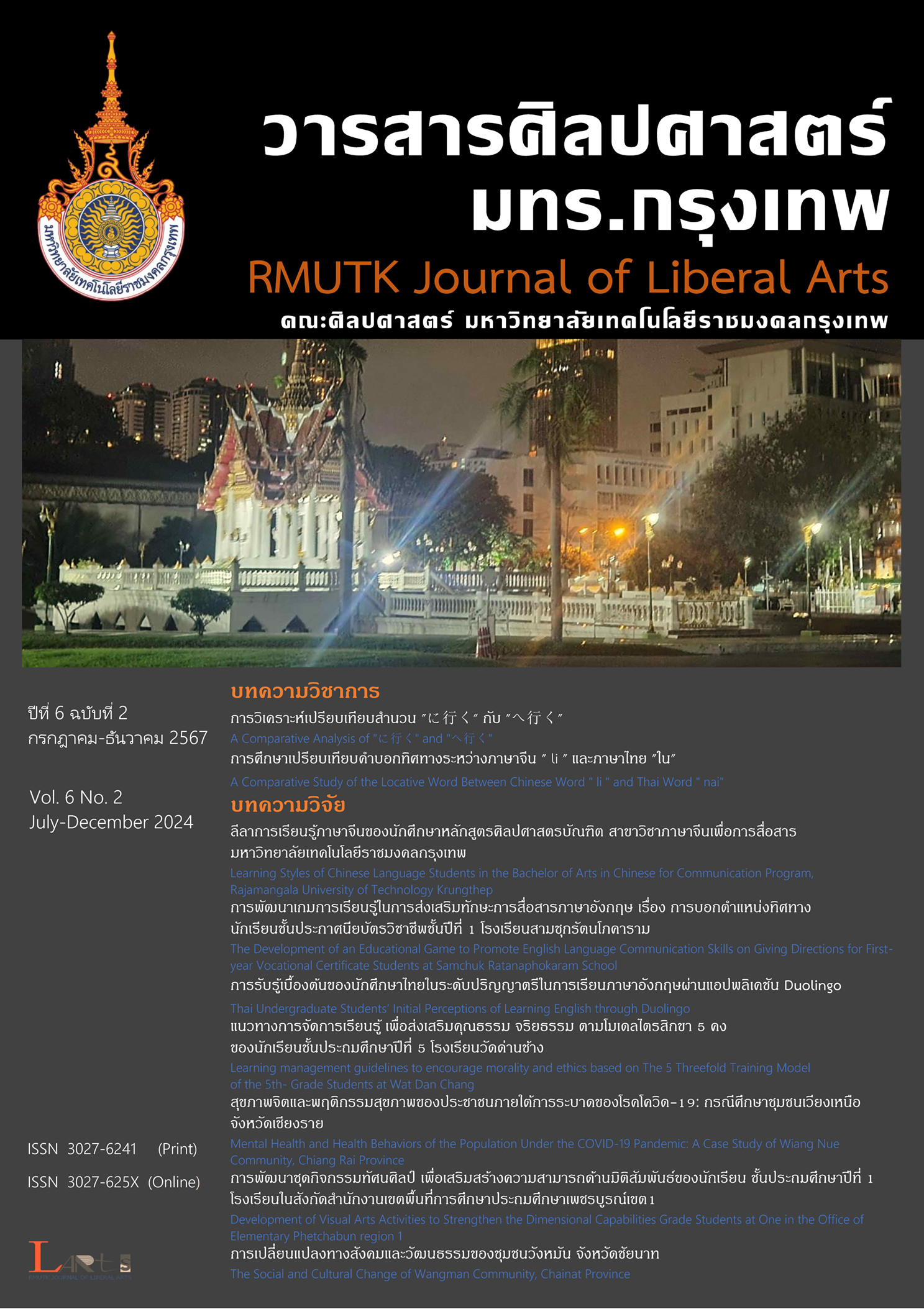การรับรู้เบื้องต้นของนักศึกษาไทยในระดับปริญญาตรีในการเรียนภาษาอังกฤษผ่านแอปพลิเคชัน Duolingo
Main Article Content
บทคัดย่อ
งานวิจัยนี้ศึกษาการรับรู้เบื้องต้นของนักศึกษาไทยในระดับปริญญาตรี ในการใช้แอปพลิเคชั่น Duolingo ในการเรียนภาษาอังกฤษ กลุ่มตัวอย่างเป็นนักศึกษาชั้นปีที่สาม เอกภาษาญี่ปุ่น และเรียนวิชาโทภาษาอังกฤษจำนวน 25 คน นักศึกษากลุ่มนี้มีคุณลักษณะที่เหมาะสมสำหรับการวิจัย คือมีนักศึกษาจำนวน 24 คน ไม่เคยใช้โปรแกรม Duolingo มาก่อน และนักศึกษาหนึ่งคนเคยใช้โปรแกรมนี้เป็นเวลาน้อยกว่าหนึ่งสัปดาห์ แสดงว่านักศึกษากลุ่มนี้ไม่มีความคุ้นเคยกับโปรแกรมนี้ เครื่องมือที่ใช้ในการวิจัยคือแบบสอบถามแบบให้ค่าห้าระดับและการสัมภาษณ์แบบปลายปิด ผลการวิจัยพบว่านักศึกษามีความชอบในการใช้โปรแกรม Duolingo ในการเรียนภาษาอังกฤษ อย่างไรก็ตามมีประเด็นที่ต้องพิจารณาคือการโฆษณาและระบบการให้รางวัลของแอปพลิเคชั่น
Article Details

อนุญาตภายใต้เงื่อนไข Creative Commons Attribution-NonCommercial-NoDerivatives 4.0 International License.
เอกสารอ้างอิง
Apoko, T. W, Dunggio, A. A, & Chong, S.L. (2023). The students’ perceptions on the use of mobile-assisted language learning through Duolingo in improving vocabulary mastery at the tertiary level. English Review: Journal of English Education, 11(1), 17-26.
Aulia, H.R., Wahjuningsih, E., & Andayani, R. (2020). The effect of Duolingo application on English vocabulary mastery. Eltr journal, 4(2), 131-139.
Bates, A.W. (2015). Teaching in a Digital Age: Guidelines for design teaching and learning. Ontario: BC Campus
Brown, C., Czerniewicz, L., Huang, C. W., & Mayisela, T. (2016). Curriculum for Digital Education Leadership. A Commonwealth of Learning Concept Paper. 1-51.
Christensen, M.C., Horn B.M. & Johnson W.C. (2008). Disturbing Class: How Disruptive Innovation Will Change the Way the World Learns. USA: McGraw-Hill.
Fadilah, K. (2023). Students' perception on the use of Duolingo application in learning English during COVID-19. VISION, 18(2), 96-105.
Fitria, N., Usman, M., & Sahara, N. (2023). Duolingo application for advancing English speaking skills. Journal of Innovation in Educational and Cultural Research, 4(4), 587–595.
Guaqueta, C. A., & Castro-Garces, A. Y. (2018). The Use of Language Learning Applications as a Didactic Tool for EFL Vocabulary Building. English Language Teaching, 11(2), 61
Habibie, A. (2020). Duolingo as an Educational Language Tool to Enhance EFL Students' Motivation in Writing. British (Jurnal Bahasa dan Sastra Inggris), 9(1), 13-26.
Irzawati, I., & Unamo, A.F. (2023). Students' Perceptions and Attitudes towards the Utilization of Duolingo in EFL Learning. J-SHMIC: Journal of English for Academic, 10(2), 123-138.
Issroff, K., & Scanlon, E. (2002). Educational technology: The influence of theory. Journal of Interactive Media in Education, (6) 1-13.
Ivan Budiani, N.L., Artini, L.P., & Pratiwi, N.P. (2020). The effect of Duolingo on the writing competency of the tenth grade students of SMK N1 SUKASADA in academic year 2017/2018. Jurnal Pendidikan Bahasa Inggris Indonesia, 8(1), 21–31.
Munday, P. (2016). The Case for Using DUOLINGO as Part of the Language Classroom Experience. RIED. Revista Iberoamericana de Educación a Distancia, 19(1), 83-101.
Nguyen, E. & Su, A. (2022). Meet Luis von Ahn, the Guatemalan immigrant behind the world's most popular language app Duolingo. ABC News. Available at: https://abcnews.go.com/International/meet-luis-von-ahn-guatemalan-immigrant-worlds-popular/story?id=93122372
Rachels, J. R., & Rockinson-Szapkiw, A. J. (2018). The Effects of a Mobile Gamification App on Elementary Students’ Spanish Achievement and Self Efficacy. Computer Assisted Language Learning. 31(1-2), 72–89.
Redjeki, I.S., & Muhajir, R. (2020). Duolingo for grammar learning. Prosiding Lppm Uika Bogor.
Stevani, M. (2024). Optimizing Duolingo application usage to improve language skills among university students. Jurnal Sipakatau, 1(2), 23–29.
Syahputra, M. (2019). Duolingo gamification: Does it reduce students’ grammatical errors in writing? GEEJ (Getsempena English Education Journal). 6(1), 1–12.
Tiara, A.D., Rahman, M.A., & Handrianto, C. (2021). The students perception about use of Duolingo application for improving English vocabulary. International Journal of Education, Information Technology, and Others, 4(4), 690-701.
Yundayani, A., Suseno, M., & Herlina, E. (2023). A Duolingo-based English language skills assessment: through the eyes of vocational students. Jurnal Ilmu Pendidikan (JIP) STKIP Kusuma Negara, 15(1), 9-23. https://doi.org/10.37640/jip.v15i1.1683
Wood, R. T. (2015). Gamification in Education and Business. New York: Springer.


